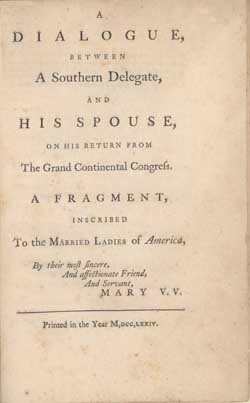A Dialogue, Between a Southern Delegate and His Spouse, on His Return from the Grand Continental Congress: A Fragment, Inscribed to the Married Ladies of America by their Most Sincere, and Affectionate Friend, and Servant, Mary V.V.
To order an image, navigate to the full
display and click "request this image"
on the blue toolbar.
-
Choose an alternate description of this item written for these projects:
- Main description
[ This description is from the project: Coming of the American Revolution ]
Written by an anonymous loyalist, this piece satirizes the first Continental Congress, questions its authority, and denounces its decisions and resolutions.
"Arbitrary and Tyrannical" Schemes
As news of Congress's decisions and resolutions spreads beyond Philadelphia, loyalists prepare their own newspaper editorials and pamphlets questioning the body's authority and denouncing its activities. Through their protests, loyalists hope to forestall implementation of the Association and to provoke at least one colonial legislature to renounce the Congress publicly and prepare its own petitions. While some loyalists, such as New York minister Samuel Seabury, write heavy-handed, direct appeals to merchants or to colonial legislatures, others apply a lighter touch as they attempt to sway public opinion. Cleverly combining criticism of the Congress with subtle commentary on women's "proper" place in society, this scribe has a fetching gift for satire.
Questions to Consider
1. Why do you think this pamphlet was written? Why is it inscribed to the "Married Ladies of America?"
2. Briefly summarize the main point of the wife's argument. How does the husband respond to her statements?
3. What, according to the wife, will the actions of the Congress "bring down, on our heads?"
4. What is a satire? What makes this piece a satire? Can you provide examples from the text? What is the author satirizing?
5. Do you think the author of this pamphlet is a man or a woman? Support your argument with words or phrases from the text, if possible.
6. Some historians have attributed this pamphlet to Thomas Jefferson. Do you think he could be the author? Why or why not?
Further Exploration
7. Write a letter to "Mary V. V." in response to this pamphlet. Do you agree with the author's views on the Congress? On the role of women?

